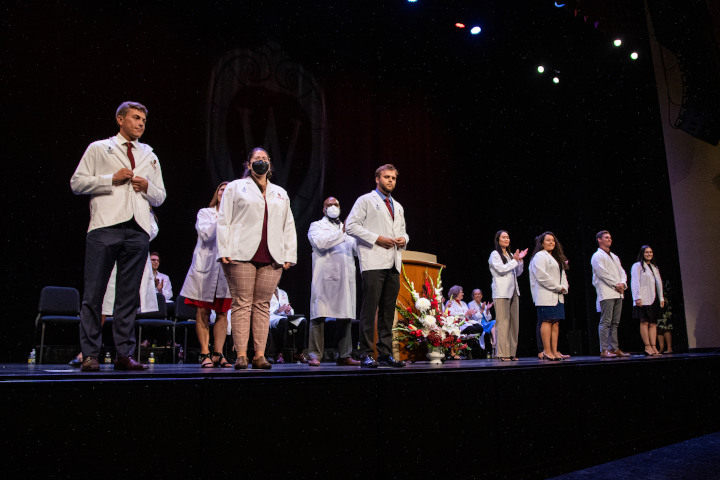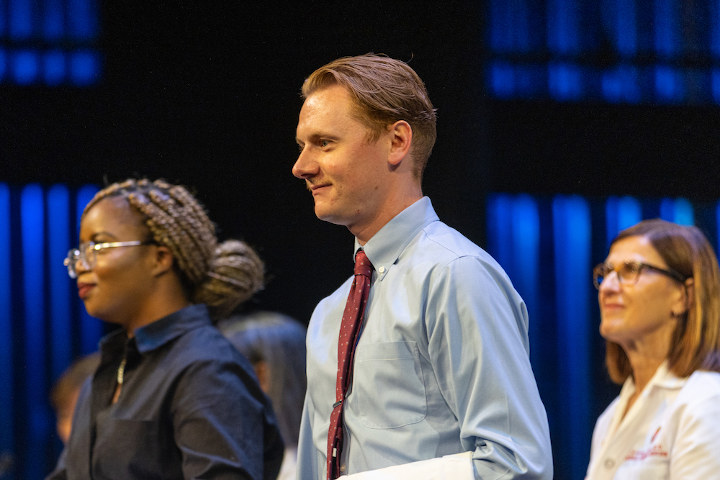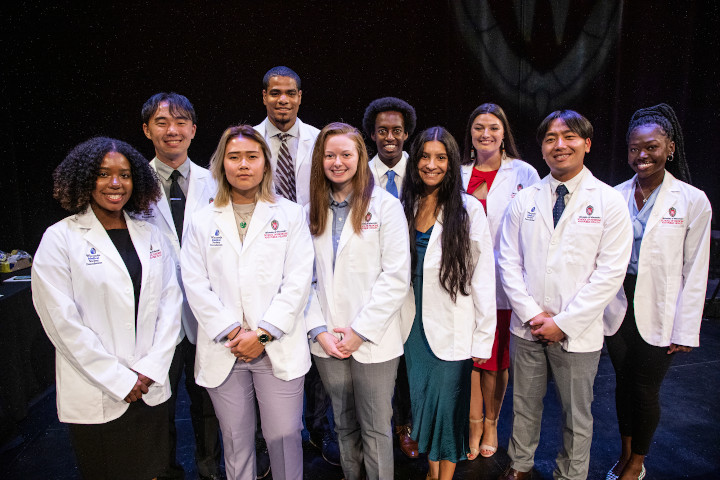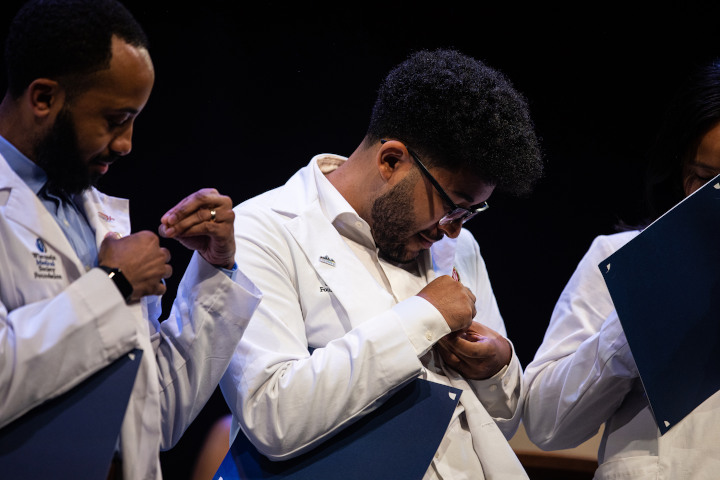With hearts and eyes set on the school’s vision of healthy people and healthy communities, incoming medical students at the UW School of Medicine and Public Health began their medical school journey at the White Coat Investiture Ceremony on Friday, Aug. 26, 2022.
The rite of passage involves students donning their first white coat in a ceremony that emphasizes the importance of compassionate care for patients and communities.
For the incoming class of 2022, the integration of public health and medicine serves as a strong undercurrent for their passions and experiences. It is clear the last few years had an impact on entering students, who set their sights on a career in medicine at a time when public health was at the forefront of societal attention.
“This ceremony is the students’ first true welcome to the profession of medicine,” says Gwenevere C. McIntosh, MD, MPH, associate dean for students. “The moment they put on their white coats it becomes truly real that they are entering into an honored profession. It is wonderful to be a part of it.”

This year the school received 5,635 applications for 176 spots. While seventy percent of the student body hails from Wisconsin and nearly sixty percent earned undergraduate degrees in the state, the class has roots in 29 US states, 10 Native Nations, and more than 15 countries. Thirty-five percent of the students in the class are from backgrounds underrepresented in medicine, a new record for the school. Seventeen percent of students were the first in their family to earn an undergraduate degree.
Dean Robert N. Golden, MD, addressed the students during the ceremony, discussing the importance of the intersection between the fields of medicine and public health in light of lessons from the pandemic.
“There are incredibly bright rays of hope breaking through the clouds, illuminating the path forward for pursuing your commitment to making a difference,” he said. “The COVID-19 pandemic has provided brutal confirmation of the immense value of our innovative integration of medicine and public health, a model that is now woven into your curriculum in a way that will prepare you to lead the advancement of health for people and populations.”
Golden also commented on the transition students must undergo as they begin medical school. Hyper-competitive habits that may have been adopted earlier must fall away as students come together to work as a team, learn all they can, and build community to care for patients and each other.
“During the pre-med experience, individual achievement may have seemed more important than collaborative teamwork,” he said. “Please understand that the real ‘competition’ is external, including the evolving pathogenic microbes, the environmental factors, the social determinants of health disparities…and of course the Michigan football team.”
Kathleen Shannon, MD, chair of the Department of Neurology, gave a keynote address to students to provide advice as they begin medical school.
“You’re going to meet some wonderful professional people who are full of passion during your next years here,” she said. “I encourage you to ask them what their own superhero origin story is and how they came to do and love what they do. I hope that you also have a career where you wake up and think that you truly love your job.”
The white coats students receive at the ceremony are gifts sponsored by the Wisconsin Medical Society. Soon the students will also receive their first stethoscopes, which are donated by alumni through the school’s Wisconsin Medical Alumni Association. The presidents of both organizations also briefly addressed the class.
Students bring wide variety of experiences, backgrounds, and perspectives
Members of the incoming class bring with them an array of incredible stories and experiences that shaped their decision to enter medical school and will influence the physician they will become. Some students completed their undergraduate degree recently, while others have been in the workforce for many years. Some are fulfilling a childhood dream of becoming a doctor, while others were inspired more recently to join a profession that provided life-saving care to a loved one.
Shane Hoffman is no stranger to health care, joining the MD program after beginning his career as a nurse. He studied nursing as an undergraduate at UW–Madison, and also served as one of the ultimate ambassadors of the university: Hoffman sported a Bucky Badger costume and played the university’s beloved mascot. In what would prove to be a foreshadowing moment, his first gig as Bucky was at the school’s 2017 Doctor of Medicine Graduate Recognition Ceremony.

Hoffman’s nursing duties took him to a hospital in Adams-Friendship, Wis., to work in the emergency department. He would go on to work at UW Health in Madison as a nurse in the emergency department and in transplant and the trauma and life support center. During the early days of the COVID-19 pandemic, he served in the COVID-19 intensive care unit.
His love for the nursing profession and for his colleagues is strong, but as his career unfolded, he wanted to be involved in a different aspect of patient care. A native of Lake Mills, Wis., Hoffman will enter the school’s Wisconsin Academy for Rural Medicine (WARM), with the eventual goal of treating patients in rural areas.
“I love nursing, and I love nurses and the vital job that they do,” he says. “It’s more about my very personal goals and interactions I want to have with patients. While deciding on medical school, I kept coming back to WARM and the Wisconsin Idea and trying to promote that in everything I do.”
Pathway programs connect students from historically underrepresented backgrounds to health professions
For incoming student Nia Foster, the hospital can oddly feel like home. Foster spent many hours in the hospital with her grandfather during her childhood until he passed away in 2019, following a long battle with diabetes and kidney disease. She comes from a family of medical professionals but will be the first medical doctor among her relatives. Her father, a radiology technician, ensured she was familiar with clinical settings.
“I feel as if I basically grew up in the hospital,” she says. “But I didn’t think that meant I was going to go into medicine. I explored many different careers, but always ended up back at helping others through medicine.”

Foster attended Spelman College, a historically Black, women’s liberal arts college in Atlanta, Georgia. The UW School of Medicine and Public Health partners with Spelman as part of Rural and Urban Scholars in Community Health (RUSCH), a pre-med pathway program designed to nurture students who show an interest in practicing medicine in rural and urban underserved areas of Wisconsin. RUSCH also has partnerships with UW–Milwaukee, UW–Platteville, and UW–Parkside, and engages with Wisconsin’s Native American college students enrolled in bachelors degree programs at any UW System campus.
Over a span of two years, undergraduates who participate in RUSCH complete internships, seminars, medical school admissions workshops, and more. Another pathway program, called the Health Professions Shadowing Program (HPSP), is operated jointly with the UW–Madison Center for Pre-Health Advising and utilizes connections and resources at UW Health. The two-week summer program allows students to explore a career in health care.
These programs were created in part to facilitate opportunities for students from backgrounds historically underrepresented in medicine. The incoming class of 2022 has a record-breaking 11 students who are alumni of these pathway programs, nine of whom identify as having an underrepresented background.
Through RUSCH, Foster gained her first exposure to the Madison area and the UW School of Medicine and Public Health. She completed an internship with the Foundation for Black Women’s Wellness in Madison, a nonprofit devoted to advancing the health and wellness of Black women and girls. Through her experiences with RUSCH and the foundation, she envisioned a place for herself in the MD program. Foster is the first Spelman alumna in 11 years to join the school after participating in RUSCH.
“RUSCH allowed me to see how physicians can actually go into communities and work with them, and the foundation showed me the possible impact of that work,” she says. “It allowed me to see that I could focus on these public health aspects in medical school and as a physician.”
Fourth-year medical students set examples for incoming class
Coupled with this ceremony each year is the induction of fourth-year students into the Gold Humanism Honor Society. The society is sponsored by the Arnold P. Gold Foundation, an organization devoted to elevating the principles of humanism, compassion, integrity, respect, and service in medicine.

Fourth-year students are selected for induction by their classmates. These fourth-year inductees then elect two faculty members and one resident to join them in the society. The ceremony helps foster connections between the newest students in the program and those approaching their final year of medical school.
“One of the best aspects of your training here will be your interactions with each other, as well as with colleagues in other classes,” Golden told the incoming class as he introduced this portion of the ceremony. “Those in upper classes can serve as role models and sherpas for you on your journey.”
The festivities were livestreamed, drawing more than 350 friends and family members to watch from many corners of the country and globe. Photos from the event, a downloadable program, and links to media coverage can be found at go.wisc.edu/smphwhitecoat.